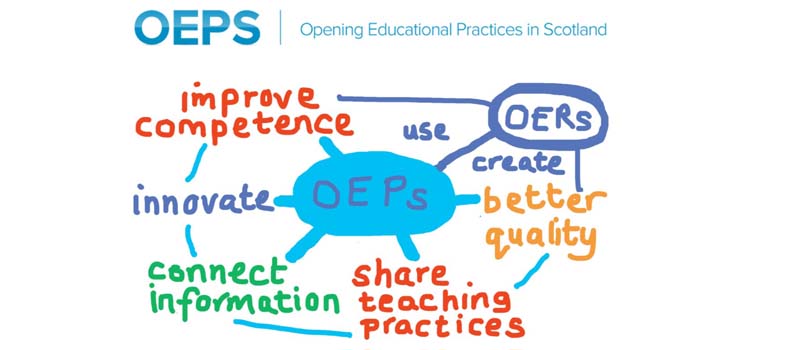The University of the West of Scotland
The University of the West of Scotland (UWS) is currently consulting on an institutional policy on open educational resources to encourage greater understanding and wider use of openly licensed material. Before drafting the policy, the university received input and expert advice from the Opening Educational Practices in Scotland (OEPS) project.
Staff at the university's Learning Innovations Department have long recognised that open educational resources (OER) save duplicating time and effort. 'Why reinvent the wheel when there are so many good open resources out there?' says E-learning Developer, Lesley Hamilton. Lesley like other members of the Learning Innovations Department, is adept at adapting open material. For example, when UWS switched from using Blackboard to Moodle, they reversioned the training guide developed by York St John's University. Although there are pockets of open educational practice elsewhere in the university, for example within the Health, Nursing & Midwifery School which has a history of co-authoring education material, UWS is keen to engender a wider understanding of OER amongst all staff.
The university's OER policy has been championed by the Associate Vice-Principal for Education, and has been taken forward by senior staff within the university's Learning Innovations Department and library, notably, Nik Hussin, Resources Librarian (Copyright and Research).
The policy, modelled on one developed by the University of Leeds, provides a definition of OER, clarifies how such resources should be presented and sets out the institution's stance on copyright in relation to OER. Specifically, the policy recommends use of a Creative Commons Attribution Share-Alike license i.e. a license which allows the material to be adapted but not rebranded.
Development of the policy has itself generated greater awareness of openly licensed material across the university as the Education Advisory Committee, which includes various heads of departments and representatives from the university's six schools and student body, has widely consulted on the draft document.
Student representatives have particularly welcomed the policy as they can see the potential of encouraging greater use of OER across the sector from a learner's perspective. They have also expressed interest in working with library staff to develop their own open material.
Whilst the OER policy was in development, OEPS was invited to deliver a Learning Design Workshop and a workshop on creating OER to staff. UWS were keen to bring in OEPS to draw on their expertise and to attract interest from a wider group of staff. Over fifty people from across the university attended the workshops, which were open to all staff, including professional services staff.
Feedback from the workshops was very positive, with Lesley Hamilton/staff at the Learning Innovations Department stating that OEPS had been particularly helpful in challenging certain mindsets and addressing barriers to greater engagement with OER, such as a lack of understanding around copyright which was inhibiting some staff, even those who were already using open material, from creating their own openly licensed material.
Lesley said that following the workshops, she felt reinvigorated about the medium of OER and went on to create an open guide for staff on how to develop open courses.
Once approved by Senate, it is anticipated that the OER policy will be supported by further internal training workshops. The University will also aim to establish a repository for OER developed by staff, which will be open to the wider community. The repository will be designed so it can measure what material is being downloaded and adapted, and by whom. This feature will allow staff to seek feedback from users and adapt their material accordingly.
UWS will join a growing number of Scottish HEIs that have established a repository for OER which will further help the sharing of learning materials across the sector. The university also hopes to promote the repository to their partners, including local colleges and schools, so they too can draw on the OER that have been developed.
By establishing an OER policy, the university has also taken the first step towards supporting a growing movement in the sector for open textbooks.
As UWS uses the open source software XERTE, it is also hoped that staff will share any open learning materials they produce with the XERTE community.
Lesley Hamilton and Nik Hussin/Staff from the Learning Innovation Department and the university's library believe that although there is no way of measuring it, the input from OEPS has been very valuable to UWS, particularly as the sector as a whole is only just beginning to understand and tap into the potential of OER. Lesley has been using the Department's twitter account to retweet relevant news and development from OEPS to keep up the momentum as the university's OER policy is taken forward.
The university's OER policy will go to Senate for approval in June 2017.
